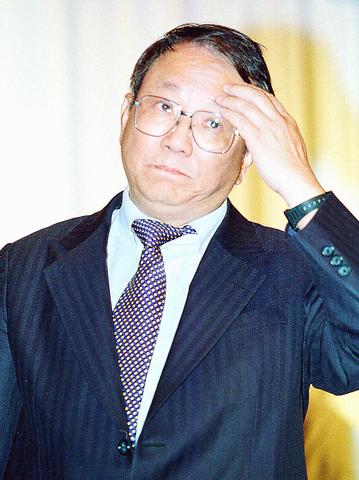Minister of Education Ovid Tzeng (曾志朗) yesterday announced he would suggest to the Executive Yuan that the Hanyu Pinyin system (漢語拼音) be adopted as the standardized system of Romanizing Mandarin.
However, Tzeng's decision was criticized by Chiang Wen-yu (
Tzeng did not respect the opinion of the professionals -- given that he did not consult any of the council's members before announcing his decision yesterday, they said.

PHOTO: LIN CHENG-KUNG, TAIPEI TIMES
They said they would resign from their posts if Tzeng insisted on his decision.
Tzeng's decision has put a halt to the prolonged debate over which Romanization system Taiwan is to use, as tension between supporters of Hanyu and Tongyong shows no signs of easing.
Contention has centered on supporters of the Hanyu system who claim it is an internationally accepted system, while promoters of Tongyong, a system created by a group of Taiwanese linguists, say that it is a more suitable system for Taiwan's children to learn their mother tongues.
The two systems are 85 percent similar.
During a press conference held yesterday at the Ministry of Education, Tzeng said his decision was made in accordance with the conclusion reached on July 26 last year by the Executive Yuan's Educational Reform Committee, which recommended Hanyu be used as the official way of Romanizing Mandarin in Taiwan on the grounds that it is the best method to fulfil the needs of an increasingly globalized and computerized economy.
Tzeng said that the stance of the Executive Yuan hadn't changed since that time.
The education minister continued to explain the reasons for his selecting Hanyu over Tongyong.
"I appreciate the Mandarin Promotion Council's hard work on this matter, given its determination to preserve our native languages," Tzeng said. "However, their decision is in defiance of the agreement made by the Executive Yuan last year. Besides, there has been no tangible evidence to prove Tongyong is a favorable system in the learning of native languages ? Tongyong is not fully developed at the moment, so its practicability remains unknown."
On the other hand, Hanyu, acknowledged by the UN in 1986, is a tool developed as a result of years of research.
It has proven to be a stable system and is the most prevalent Mandarin Romanization system in use today, Tzeng said, adding that to choose a system corresponding to international usage should be of critical concern because it is Taiwan's national goal to re-enter the UN.
Tzeng conceded that no system was perfect, however, he said he did not see any complete compatibility between the two systems in the short term. Therefore he would suggest using Hanyu as a foundation, but making slight adjustments based on the spirit of Tongyong.
He said problematic morphemes in the Hanyu system such as "X," "Q" and "Z" should be improved after more research.
When asked by the media about the system to be adopted by elementary school students to learn native languages when the program begins next year, Tzeng said that he would be recommending the adoption of the traditional Mandarin Phonetic Symbols (注音符號) used in Taiwan (also known as "bopomofo") which would be supplemented by notation that would be needed in specific cases.
He also decided that Academia Sinica would be charged with looking into this question in a year's time.

The combined effect of the monsoon, the outer rim of Typhoon Fengshen and a low-pressure system is expected to bring significant rainfall this week to various parts of the nation, the Central Weather Administration (CWA) said. The heaviest rain is expected to occur today and tomorrow, with torrential rain expected in Keelung’s north coast, Yilan and the mountainous regions of Taipei and New Taipei City, the CWA said. Rivers could rise rapidly, and residents should stay away from riverbanks and avoid going to the mountains or engaging in water activities, it said. Scattered showers are expected today in central and

People can preregister to receive their NT$10,000 (US$325) cash distributed from the central government on Nov. 5 after President William Lai (賴清德) yesterday signed the Special Budget for Strengthening Economic, Social and National Security Resilience, the Executive Yuan told a news conference last night. The special budget, passed by the Legislative Yuan on Friday last week with a cash handout budget of NT$236 billion, was officially submitted to the Executive Yuan and the Presidential Office yesterday afternoon. People can register through the official Web site at https://10000.gov.tw to have the funds deposited into their bank accounts, withdraw the funds at automated teller

COOPERATION: Taiwan is aligning closely with US strategic objectives on various matters, including China’s rare earths restrictions, the Ministry of Foreign Affairs said Taiwan could deal with China’s tightened export controls on rare earth metals by turning to “urban mining,” a researcher said yesterday. Rare earth metals, which are used in semiconductors and other electronic components, could be recovered from industrial or electronic waste to reduce reliance on imports, National Cheng Kung University Department of Resources Engineering professor Lee Cheng-han (李政翰) said. Despite their name, rare earth elements are not actually rare — their abundance in the Earth’s crust is relatively high, but they are dispersed, making extraction and refining energy-intensive and environmentally damaging, he said, adding that many countries have opted to

PEACE AND STABILITY: Maintaining the cross-strait ‘status quo’ has long been the government’s position, the Ministry of Foreign Affairs said Taiwan is committed to maintaining the cross-strait “status quo” and seeks no escalation of tensions, the Ministry of Foreign Affairs (MOFA) said yesterday, rebutting a Time magazine opinion piece that described President William Lai (賴清德) as a “reckless leader.” The article, titled “The US Must Beware of Taiwan’s Reckless Leader,” was written by Lyle Goldstein, director of the Asia Program at the Washington-based Defense Priorities think tank. Goldstein wrote that Taiwan is “the world’s most dangerous flashpoint” amid ongoing conflicts in the Middle East and Russia’s invasion of Ukraine. He said that the situation in the Taiwan Strait has become less stable